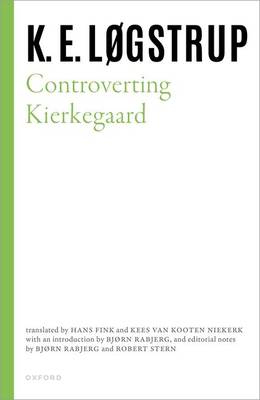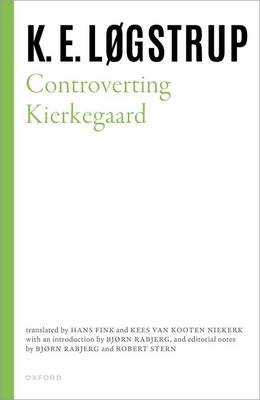
En raison d'une grêve chez bpost, votre commande pourrait être retardée. Vous avez besoin d’un livre rapidement ? Nos magasins vous accueillent à bras ouverts !
- Retrait gratuit dans votre magasin Club
- 7.000.000 titres dans notre catalogue
- Payer en toute sécurité
- Toujours un magasin près de chez vous
En raison de la grêve chez bpost, votre commande pourrait être retardée. Vous avez besoin d’un livre rapidement ? Nos magasins vous accueillent à bras ouverts !
- Retrait gratuit dans votre magasin Club
- 7.000.0000 titres dans notre catalogue
- Payer en toute sécurité
- Toujours un magasin près de chez vous
Controverting Kierkegaard
K E Løgstrup, Hans Fink, Kees Van Kooten Niekerk, Bjørn Rabjerg, Robert Stern
91,95 €
+ 183 points
Description
This is the first English edition of a major work by the Danish philosopher and theologian K. E. Løgstrup (1905-81). It is the culmination of his critical engagement with Kierkegaardianism, which had begun almost 20 years earlier. In this text, Løgstrup focuses on four main themes in Kierkegaard: his understanding of Christ and thus of Christianity; his understanding of suffering in human existence; Christian vs. secular ethics; and Platonistic influences on Kierkegaard's position, which Løgstrup characterises as nihilistic. Løgstrup presents his own alternative conception in response: that Christ revealed universal ontological ethical structures that put Christians and non-Christians on a par; that suffering is a basic human experience and so there is no such thing as a particular Christian suffering; that sovereign expressions of life such as trust, sincerity, and compassion are the fundamental phenomena of ethics that enable our lives to function, and are thus given as a gift of creation, not of faith; and finally that human existence as created is meaningful and holds value and so is not a Kierkegaardian 'nothingness' of mere relativity. As well as offering a classic and yet controversial critique of Kierkegaard, this text also develops Løgstrup's conception of the sovereign expressions of life, which was to become central to his later ethics, further deepening his distinctive understanding of the human condition. Here translated in full for the first time, it will now be possible for English-speaking readers to explore the issues that drew Løgstrup into his controversion with Kierkegaard.
Spécifications
Parties prenantes
- Auteur(s) :
- Editeur:
Contenu
- Nombre de pages :
- 224
- Langue:
- Anglais
- Collection :
Caractéristiques
- EAN:
- 9780198874768
- Date de parution :
- 25-08-23
- Format:
- Livre relié
- Format numérique:
- Genaaid
- Dimensions :
- 162 mm x 240 mm
- Poids :
- 471 g

Les avis
Nous publions uniquement les avis qui respectent les conditions requises. Consultez nos conditions pour les avis.






